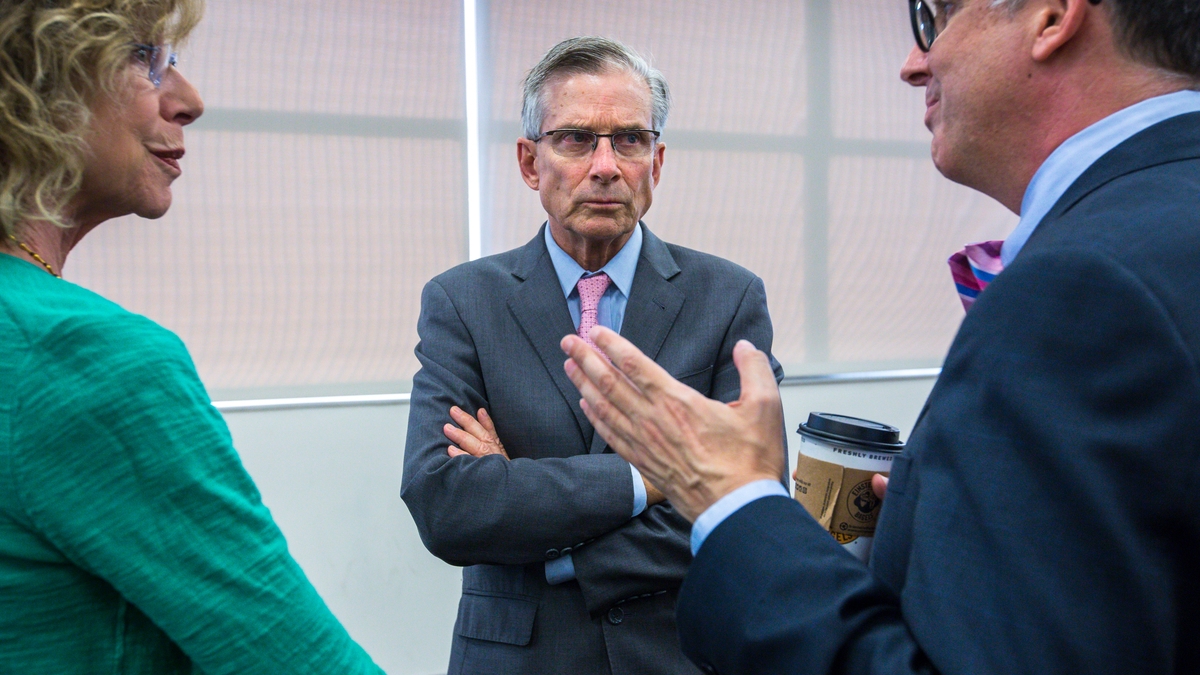'Bro' Adams: ASU on the 'leading edge' of humanities research

Institute for Humanities Research director Sally Kitch, and William "Bro" Adams, chair of the National Endowment for the Humanities, center, listen to Humanities Dean George Justice, before Adams speaks at the IHR’s 10th Anniversary Series Kickoff: "The Future and Value of Humanities Research," on Thursday, Sept. 24, 2015. Adams spoke of governmental support for the public humanities is crucial to our national welfare.
Photo by: Charlie Leight/ASU News
Against the recent backdrops of racial strife, immigration debates, same-sex marriage laws and other events that display human suffering or oppression, some might say the calming or enlightening properties of the humanities are needed now more than ever.
It’s a notion shared by William “Bro” Adams, chairman of the National Endowment for the Humanities, who spoke at ASU’s Tempe campus on Thursday about how funding the public arts is crucial to our nation's welfare.
“Most of the big challenges we face as a country are not primarily scientific or technical,” Adams said. “The real challenges we face are those that revolve around our history, culture, ideas and values.”
Adams cited the ongoing crisis between law enforcement and minority communities as an example.
“We’ve been through this yearlong, scorching experience with police and race relations in this country and there’s no way to get perspective without reengaging the history of race relations and first understanding the cultural dimensions of our various experiences of what it means to be an American, what it means to live here, and how different groups experience America differently.”
Adams’ visit coincides with the 10th anniversary of ASU’s Institute for Humanities Research (IHR) and kicked off a series of events and lectures that will continue through October. His keynote lecture, “The Future and Value of Humanities Research,” focused on the role the arts and culture play in our society, and how they can do more to address major challenges.
The former Fulbright Scholar, Army veteran and president of Colby College in Waterville, Maine, said he became a student of the humanities after his experiences as an infantry advisor during the Vietnam War.
“There wasn’t a lot of time in Vietnam to be reading classical texts or literature, but there was an attempt by me to make sense of that experience.” Adams said. “The humanities were hugely helpful to me and affected my way of thinking.”
He credits higher education with his post-war healing.
“I was fortunate in having the resources to go to college and had great teachers in a small college setting who cared about me and wanted to help me in my intellectual pursuits,” said Adams who earned degrees from Colorado College and the University of California at Santa Cruz. “When you don’t have access to those resources, you get angry, depressed, dismissive and find other ways to manage that energy. I was lucky to have that outlet.”
Adams also tipped his hat to ASU and the resources it offers to faculty and staff. He said the university is becoming a real player on the national stage when it comes to producing humanities-related research.
“ASU wasn’t a place that was well known to me before my visit but now I’m a believer,” Adams said. “It’s very striking to me the energy that is directed toward interdisciplinary research. It’s pretty close to leading edge in regards to what’s happening nationally. It’s experimental in a way.”
In the last decade, ASU has been involved as lead investigators and key contributors in transdisciplinary projects, earning over $35 million in external funding, to date, on humanities-related research, said Sally Kitch, founding director of the IHR and recently named University Professor.
Kitch is also principal investigator for “Humanities for the Environment,” an international research project focused on human responsibility, multi-species relationships and collaborative knowledge and collective action in our current era of human development.
“A great university has to have a robust humanities program, and we’re fortunate that we have support from our president and resources for our faculty,” Kitch said. “Humanities scholars have a unique approach to the problems we face and can significantly help society as a whole.”
Some of the research projects conducted by the IHR — many funded and supported by the National Endowment for Humanities — include a study in India intersecting wildlife and religion; a Sonoran borderlands project that studies how different cultures in the region have adapted to the environment and formed communities; and a seminar that examined influential texts in 20th century Jewish culture in Buenos Aires, Argentina.
“There’s an enduring value to every perspective and we’ll never run out of material,” Adams said. “I’m confident the humanities will endure and do just fine.”
For more information on ASU’s Institute for Humanities Research and its 10th anniversary, visit https://ihr.asu.edu/news-events/news/10th-anniversary.